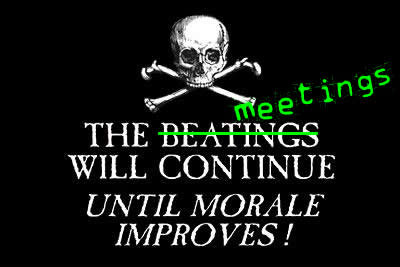Six Rules to Foster Creativity While Maintaining Efficiency Within Your Business
April 29, 2013 by The Anywhere Office · Leave a Comment
This guest post was submitted to The Anywhere Office by Erin Schwartz, a Specialist in Social Media and Affiliate Marketing.
Take a good look at any company or corporation that has been successful at doing business for any length of time and you will undoubtedly discover that they all had their own particular set of systems and processes for managing the daily functions of business: payroll, inventory, invoicing, general bookkeeping, HR and so on. Look a little further and you might even find step-by-step processes and rules in place that govern how they develop and launch new products or services or market themselves to the world.
Systems are a necessary part of keeping control and assuring quality within a business that has more than just a few employees. But when systems are allowed to become etched in stone, forever unchanging, a company is in danger of missing out on emerging technologies that could quite likely improve their bottom line and make them more competitive.
Here are six basic rules that every company, no matter what size, should follow to foster and promote an atmosphere of creativity without sacrificing consistency and quality.
It starts at the top – A company’s culture reflects the ideals and beliefs of the owner(s). Those at the top must continually give the message that change is good and that ideas for improvement are welcome. When top management embraces such a philosophy, it’s a sure bet that those underneath will also espouse similar beliefs.
Banish forever “That’s the Way We’ve Always Done It” – Having teams of people responsible for developing dynamic new products and services is only one way a company shows its creative side. Companies must also recognize that the old, tried and true way of doing something is often made obsolete by a new machine, program or process. Stubbornly refusing to even consider any changes to a ten-year old ordering or inventory system is just ridiculous. As new people join a company, they often bring with them ideas and experience gained from former places of employment. Managers need to welcome new ideas for streamlining basic systems, and not view them as a threat to the status quo.
Encourage and promote brainstorming and problem-solving round-table discussions – The power of the group mind is incredible; by sharing frustrations and successes, employees often discover new and even better ways of doing things just by tossing ideas back and forth in a casual meeting. Energize the boring staff meeting by setting aside 15-20 minutes for a no-holds-barred discussion of what’s working and what’s not, and possible ways to improve. Read more
Effective Team Management A Challenge in the Virtual Workforce
April 23, 2013 by The Anywhere Office · 2 Comments
Whitepaper: Effective Team Management A Challenge in the Virtual Workforce
Science-Based Behavioral Assessment Helps Managers Motivate, Develop and Coach Remotely
WELLESLEY, Mass., Feb. 21, 2013 /PRNewswire/ — The virtual workforce in the U.S. ballooned from 9.5 million in 1995 to 13.4 million in 2010, growing to an estimated 20-30 million people currently working remotely at least once per week. According to new whitepaper from global consulting firm PI Worldwide, despite more employees embracing—and even expecting—a distributed work environment, research indicates low levels of confidence in the ability of managers to adequately motivate, coach and develop employees within a virtual environment.
The whitepaper titled, Managing the Challenges of the New Virtual Workforce: The Use of Personality Data to Build and Develop High Performing Virtual Teams, examines the pressures facing leaders to manage and develop teams operating virtually and the benefits behavioral assessment data provides for enhancing communication, collaboration and efficiencies across different time zones and cultures.
“The most successful virtual teams are led by managers who understand what motivates and drives performance at the individual and team levels, assigning people to tasks in line with their natural behavioral styles,” said Nancy Martini , President and CEO of PI Worldwide. “Managers who apply behavioral insights produce teams that function with stronger working relationships, communicate more effectively and deliver on the team’s collective goals.”
According to a Forrester survey cited in the whitepaper, “effective communication” is a top concern for managers of remote teams (49%), followed by “managing projects and deadlines successfully (43%)” and “creating consensus during decision-making (43%).” Martini notes additional challenges of remote team management include:
- Difficulty in building a shared sense of purpose
- Over-reliance on electronic communications
- Low team cohesion and trust
- Less satisfaction with the team experience
In a remote working environment, it can be difficult for team members to build rapport or a sense of camaraderie which can jeopardize productivity. Through behavioral assessments (sometimes called personality assessments), Martini says, managers can uncover the natural behavioral characteristics of team members to better define high performance, facilitate workflow, reduce conflict and improve group synergy.
Read the rest of this article here: http://www.prnewswire.com/news-releases/whitepaper-effective-team-management-a-challenge-in-the-virtual-workforce-192330671.html
See the whitepaper here: http://www.piworldwide.com/landing-pages/virtual-workforce-hmpg.aspx
Improve Sleep to Cause a Lifestyle Change and Work Productivity
April 15, 2013 by The Anywhere Office · 1 Comment

This guest post was submitted to The Anywhere Office by Jay Ackers of safetyservicescompany.com
Fatigue at the workplace isn’t just a health and safety issue for office managers – it drains productivity. When you are healthy and alert you are happier and motivated to give your best efforts.
I lived this when I lost 60 pounds in the last year through better nutrition, exercise and yes better sleep. After looking at my personal situation, I moved to a quieter neighborhood closer to my office, invested in a sleep mask, ear plugs, white noise machine, regulated my sleep-wake schedule (even on the weekends) and stayed hydrated. I even bought a special alarm clock that gradually wakes me up with light and a phone app that monitors my sleep cycles and waits to wake me up when I’m no longer in deep sleep.
What I learned was my entire day hinged on having a refreshing night’s sleep. I would start working early and was more productive , no longer nodding off at my desk. When my work was over I was more willing to meet friends for a group run; which led to weight loss, a better diet, less stress and even better sleep.
Each positive change made other changes easier and more effective. If you aren’t getting enough sleep, look at your own situation and decide what changes you need to make. Read more
How Politeness Can Ruin Your Team’s Meetings
April 9, 2013 by The Anywhere Office · Leave a Comment

Once again Wayne Turmell has gotten right down to the core of a common problem. Sometimes it seems like most meetings are so dreadful because everyone is just smiling and nodding; that moves nothing forward and improves no one’s morale. As you know, these ‘time and energy suck’ issues are often exacerbated when taken virtual. And that can be enough to make you want to go, as Turmell would say, ‘full Captain Bligh on people’… lol.
This is not to say you go full Captain Bligh on people, humiliating them at will and whipping them into shape, but it does mean that both meeting leaders and participants have expectations on them that need to be met.
Read this excellent article at the link below.



